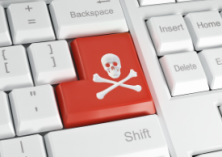
Danish consumption of legal streaming services is currently on the rise having seen increased demand during the coronavirus pandemic. According to a new study from Denmark's Chamber of Commerce, however, pirate consumption in the previous 12 months remained high.
The data for the study was collected in February 2020 among 2,000 citizens aged 18 and above. All were assured of their anonymity in an effort to obtain the most accurate results. The study's conclusion is that illegal streaming and downloading remains a problem in Denmark.
Around One-in-Ten Danes Consume Content From Illegal Sources
While around 34% of Danes admit to having consumed some pirated content in their lives, around 12% of the population downloaded or streamed illegal content during the previous 12 months, up slightly from 10% revealed in a similar study published by the Chamber in 2018.
Despite the increase, the study's authors conclude that given statistical uncertainty in the report, piracy levels may well have remained stable.
Downloading content from unlicensed sources remained static when compared to 2018, with 7% of all respondents taking part. Streaming was slightly up in 2020, 9% versus 7% in 2018, with the 12% overall figure reached when consumption methods were combined.
Younger Adults Dominate Pirate Consumption
Among younger people aged between 18 and 29-years-old, illegal downloading and streaming was much more prevalent and indeed the dominant pirate consumption group.
Around 41% of this bracket admitted to engaging in the practice during the last 12 months, up from 28% in 2018. When this group was asked whether they'd ever consumed from pirate sources, 60% admitted that they had done so.
Movies & TV Shows Popular Among Pirates, Music Much Less So
The main types of content consumed illegally were movies and TV shows, with 85% of pirate consumers targeting these categories, up from 81% in 2018. In contrast, the consumption of music from unlicensed sources decreased considerably, from 32% in 2018 to 22% in 2020, prompting the following commentary from the Chamber.
"If the trend of the study is real, one possible explanation could be that part of the illegal consumption has been converted to legal alternatives such as Spotify, Apple Music or the like, which can be included in many subscription packages when Danes buy telephony and internet products," the researchers write.
"In addition, the supply of content is more or less the same across the various music services. This contrasts with streaming services for movies and TV series, where content varies widely from service to service and is thus often exclusive content for each service.
"This can create an incentive for consumers to stream part of the exclusive content illegally, with the cost of streaming differently content from a handful of different services is too great. This incentive is not found to the same degree with music streaming, where most consumers will have access to all that they want through just a single music service."
Live Sports Streaming Popular With Men
Without a specific entry in 2018, sporting event piracy was detailed for the first time in this year's report at 14% of pirate consumers. The study found that in excess of 20% of the men who admitted to streaming illegally during the past year had streamed live sports.
Ebook piracy increased slightly over the past two years, from 10% to 13% in 2020, with sundry other content not specifically categorized dropping from 6% to 4% this time around.
Attitudes Towards Pirate Consumption
With the numbers of citizens engaging in piracy remaining largely static, it's interesting to note that despite efforts to convince the public that illegal consumption is wrong, attitudes don't appear to be changing at pace.
When questioned, 11% of all respondents felt that "it's alright" to pirate content in 2020, a figure unchanged since the previous report in 2018. Those who feel it's "not okay" increased slightly from 66% to 68%, with 22% not expressing an opinion either way.
Unsurprisingly, younger respondents were more likely to say that piracy is acceptable, with 23% of 18 to 29-year-olds having no problem with it.
"Danes continue to stream and download illegally on the Internet and that may be because they largely believe that illegal streaming and downloading is okay," the researchers write.
"The study shows that one-in-ten Danes still think it's okay to stream or download illegally, while every fifth Dane does not have a clear stance on the question. When one-third of Danes do not clearly distance themselves from the illegal use of digital content online, it may help to explain why so many Danes still break the law on the Internet."
Piracy is Not as Bad As Other Kinds of 'Stealing', Danes Say
Piracy is often equated with other activities that can deprive owners of what should be theirs but according to the survey, it is low down the list in comparison.
Traveling by train without a valid ticket was declared unacceptable by 88% of respondents, with the same percentage stating that stealing sweets from a supermarket is wrong. In comparison, 80% labeled illegal downloading as unacceptable, a figure that drops to just 69% in respect of illegal streaming.
Again, the younger age group stood out for its liberal attitude, with 65% of 18 to 29-year-olds labeling illegal downloading as unacceptable with just 45% feeling the same about illicit streaming.
The full report can be found here (pdf, Danish)
From: TF, for the latest news on copyright battles, piracy and more.
No comments:
Post a Comment